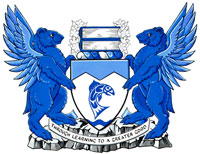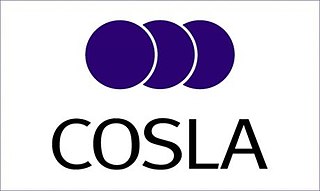
An accountant is a practitioner of accounting or accountancy. Accountants who have demonstrated competency through their professional associations' certification exams are certified to use titles such as Chartered Accountant, Chartered Certified Accountant or Certified Public Accountant, or Registered Public Accountant. Such professionals are granted certain responsibilities by statute, such as the ability to certify an organization's financial statements, and may be held liable for professional misconduct. Non-qualified accountants may be employed by a qualified accountant, or may work independently without statutory privileges and obligations.

Education in England is overseen by the Department for Education. Local government authorities are responsible for implementing policy for public education and state-funded schools at a local level. State-funded schools may be selective grammar schools or non-selective comprehensive schools. All state schools are subject to assessment and inspection by the government department Ofsted. England also has private schools and home education; legally, parents may choose to educate their children by any suitable means.
Education in Scotland is provided in state schools, private schools and by individuals through homeschooling. Mandatory education in Scotland begins for children in Primary 1 (P1) at primary school and ends in Fourth Year (S4) at secondary school. Overall accountability and control of state–education in Scotland rests with the Scottish Government, and is overseen by its executive agency, Education Scotland, with additional responsibility for nursery schools being the joint responsibility of both Education Scotland and the Care Inspectorate. Scotland's private schools are overseen by the Scottish Council of Independent Schools. Children in Scotland sit mandatory National Standardised Assessments in Primary 1 (P1), Primary 4 (P4), Primary 7 (P7) at the end of primary school, and Third Year (S3) in secondary school, which assist in monitoring children's progress and providing diagnostic data information to support teachers' professional judgement.
Standard Grades were Scotland's educational qualifications for students aged around 14 to 16 years. Introduced in 1986, the Grades were replaced in 2013 with the Scottish Qualifications Authority's National exams in a major shake-up of Scotland's education system as part of the Scottish Credit and Qualifications Framework overhaul.

Kaplan, Inc. is an international educational services company that provides educational and training services to colleges, universities, businesses and individuals around the world. Founded in 1938 by Stanley Kaplan, the company offers a variety of test preparation, certifications, and student support services. The company is headquartered in Fort Lauderdale, Florida, and is a wholly owned subsidiary of Graham Holdings Company.

SAS is a statistical software suite developed by SAS Institute for data management, advanced analytics, multivariate analysis, business intelligence, criminal investigation, and predictive analytics. SAS' analytical software is built upon artificial intelligence and utilizes machine learning, deep learning and generative AI to manage and model data. The software is widely used in industries such as finance, insurance, health care and education.

Public bodies of the Scottish Government are organisations that are funded by the Scottish Government. They form a tightly meshed network of executive and advisory non-departmental public bodies ("quangoes"); tribunals; and nationalised industries. Such public bodies are distinct from executive agencies of the Scottish Government, as unlike them they are not considered to be part of the Government and staff of public bodies are not civil servants, although executive agencies are listed in the Scottish Government's directory of national public bodies alongside other public bodies.

Capilano University (CapU) is a teaching-focused public university based in North Vancouver, British Columbia, Canada, located on the slopes of the North Shore Mountains, with programming that also serves the Sea-to-Sky Corridor and the Sunshine Coast. The university is named after Chief Joe Capilano Sa7plek (Sahp-luk) who was the leader of the Squamish people (Sḵwx̱wú7mesh) from 1895 to 1910.
The National Grid for Learning (NGfL) was a UK government-funded gateway to educational resources on the Internet. It provided a curated collection of links to resources and materials of high quality. The NGfL was established to support schools in England, while separate grids were created for schools in Northern Ireland, Scotland, and Wales.

The Convention of Scottish Local Authorities (COSLA) is the national association of Scottish councils and acts as an employers' association for its 32 member authorities.

Building Schools for the Future (BSF) was the name given to the British government's investment programme in secondary school buildings in England in the 2000s. Around half of the work was procured under the private finance initiative. The delivery of the programme was overseen by Partnerships for Schools (PfS), a non-departmental public body formed through a joint venture between the Department for Children, Schools and Families (DCSF), Partnerships UK and private sector partners. The programme was cancelled in 2010.
The tax system of the Russian Federation is a complex of relationships between fiscal authorities and taxpayers in the field of all existing taxes and fees. It implies continuous communication of all its members and related objects: payers; legislative framework; oversight authorities; types of mandatory payments. The Russian Tax Code is the primary tax law for the Russian Federation. The Code was created, adopted and implemented in three stages.
Education in the Philippines is compulsory at the basic education level, composed of kindergarten, elementary school, junior high school, and senior high school. The educational system is managed by three government agencies by level of education: the Department of Education (DepEd) for basic education; the Commission on Higher Education (CHED) for higher education; and the Technical Education and Skills Development Authority (TESDA) for technical and vocational education. Public education is funded by the national government.

The United States Department of Defense is an executive branch department of the federal government of the United States charged with coordinating and supervising all agencies and functions of the U.S. government directly related to national security and the United States Armed Forces. As of November 2022, the U.S. Department of Defense is the second largest employer in the world—After India; and potentially China, if including the Central Military Commission. With over 1.4 million active-duty service personnel, including soldiers, marines, sailors, airmen, and guardians. The Department of Defense also maintains over 778,000 National Guard and reservists, and over 747,000 civilians bringing the total to over 2.91 million employees. Headquartered at the Pentagon in Arlington County, Virginia, just outside Washington, D.C., the Department of Defense's stated mission is to provide "the military forces needed to deter war and ensure our nation's security".

The London Grid for Learning commonly referred to as LGfL is a British not for profit technology company with headquarters in central London. The charity founded in 2001 procures, develops and delivers technology and educational content including broadband connections, filtering and safeguarding services, devices and software and licences. LGfL started in London but is now a nationwide organisation winning multiple awards such as ERA Education Supplier of the Year.

Community Education, also known as Community-Based Education or Community Learning & Development, or Development Education is an organization's programs to promote learning and social development work with individuals and groups in their communities using a range of formal and informal methods. A common defining feature is that programmes and activities are developed in dialogue with communities and participants. The purpose of community learning and development is to develop the capacity of individuals and groups of all ages through their actions, the capacity of communities, to improve their quality of life. Central to this is their ability to participate in democratic processes.

Mouchel Group, originally known as L. G. Mouchel & Partners Ltd, was an infrastructure and business services company headquartered in Woking, United Kingdom. It provided advisory, design, project delivery and managed services associated with infrastructure and business services across the highways and transportation, local government, emergency services, property, health, education and utility markets across the world.

Curriculum for Excellence is the national curriculum in Scotland, used by Scottish schools for learners ages 3–18. The implementation of Curriculum for Excellence is overseen by Education Scotland, the executive agency of the Scottish Government responsible for the education system in Scotland.
Bromcom Computers plc is a British technology company, based in Bromley. It provides schools, colleges, local authorities and multi academy trusts with Cloud MIS and Finance software.

RM plc is a British company that specialises in providing information technology products and services to educational organisations and establishments. Its key market is UK education including schools, colleges, universities, government education departments and educational agencies.













